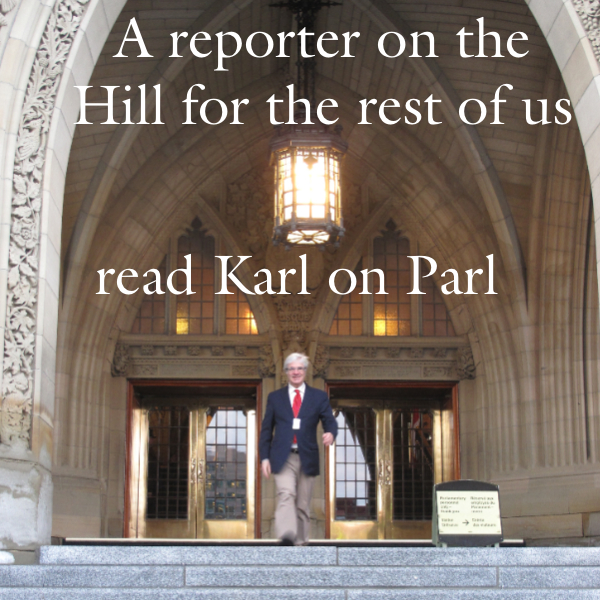Keep Karl on Parl! Donate today to have Parliamentary reporting for the rest of us.
Can these guys both be right?
In his piece on Monday for The Globe and Mail Jeffrey Simpson writes the following about the Official Opposition’s position on the free trade deal with Europe:
“This Canada-EU agreement. . . was a litmus test for whether the NDP had really searched within itself and emerged with a more global vision for the Canadian economy. The NDP flunked the test.”
Writing on the same subject, on the same day, for the Postmedia papers Michael Den Tandt says the opposite:
“. . .liberalized trade spurs growth and creates jobs . . . That’s probably why the New Democratic Party’s tune has . . . changed, quite dramatically. . .If there were ever an opportunity for the NDP to make a clear break with its old, stridently anti-trade roots, this was it. It seized it.”
Whoever has the story right, the combined effect of both pieces underscores the NDP’s continuing problems with the national mainstream media.
A party unloved by Ottawa elites
Since 2011, neither the Ottawa Press Gallery mavens, nor the inside-the-Queensway elite crowd have reconciled themselves to the new, aggrandized role for what writer and journalist Lawrence Martin once called the “blue collar party.”
Historically, these insider and elite folks have not been too comfortable with the party of the moderate left — with its unseemly gang of sweaty-palmed trade unionists and activists and overly earnest do-gooders.
In a town where power and access to power are everything, the Ottawa insider class has never been able to muster much respect for a party that — to paraphrase the U.S. socialist Norman Thomas — would rather “be right on the issues” than victorious at the polls.
Moral victories do not impress inside-the-Queensway folks.
And a great many of the Ottawa insider gang never fully accepted the legitimacy of the NDP’s electoral success in 2011, based, as it was, on a massive vote swing in Quebec.
Most of those insiders — even those who speak fluent French — have a fairly distant and often condescending view of francophone Quebec.
This writer (a rare anglophone who actually spent a number of years working for French-language, Quebec-based media) is frequently asked, at Ottawa dinner and cocktail parties, if it is not true that the NDP’s winning 59 Quebec seats was an entirely evanescent phenomenon.
“Isn’t it true that those Quebeckers just flocked like sheep to the amiable persona of Jack Layton, but will come to their senses next time?” they ask.
One hates to disappoint people on friendly social occasions, but, when asked, I do have to point out that if you were to project seats/won from the current polling numbers for Quebec you would, indeed, generally get the Liberals taking all or most of the NDP’s approximately dozen seats where there are significant minority or anglophone populations.
At the same time, however, those same poll numbers tell you that the New Democrats would hold on to a good many of their predominantly francophone seats (anywhere from about 30 to upwards of 40 seats).
Den Tandt was more accurate than Simpson
Ottawa insiders may have some grudging respect for Prime Minister Harper, but generally do not like him.
They are a bit fonder of Trudeau-fils, but share the concern of many Canadians with the Liberal Leader’s thin resumé.
Nonetheless, those insiders do seem to be relieved that recent opinion polls show a return to the old Liberal-Conservative dynamic, with those “blue collar” NDP-ers relegated to their traditional third place status.
The next election is something like 24 months off, of course. There is much that can slip between “the shadow and the act” over a two year period.
As for today’s contradictory media analyses of the NDP’s position on the Canada-EU deal (for which there are as yet scant details): again, they are less important for what they say than for what they reveal about elite and media attitudes.
For what it is worth, in this case, Den Tandt is closer to the truth.
The Official Opposition’s Trade Critic Don Davies came out with a statement last week in which he said, quite unambiguously: “New Democrats welcome progress towards a comprehensive new trade agreement with the European Union.”
Davies added that New Democrats are encouraged by the relatively high labour and environmental standards of the European Union, but will await further details on the deal before making a final and formal commitment.
NDP Leader Tom Mulcair did express some initial concerns for Canadian (especially Quebec) artisanal cheese makers, but otherwise kept his powder pretty dry. Simpson inferred NDP opposition to the deal because of those cheese concerns, and seems to have completely missed Don Davies’ formal statement.
The fact that the notional party of the left is so ready to go along with Harper’s deal with Europe will not make many rabble.ca readers happy.
But facts are fact.
If the NDP is, in fact, open to at least qualified support for the EU deal, it is more than a bit unfair to falsely accuse the party of totally opposing that deal.
The sort of media misinterpretation that Simpson committed on Monday has real effects in the real world.
During Monday’s Question Period, the Prime Minister chimed in on the issue — quite possibly basing his comments on the Jeffrey Simpson version — and excoriated the NDP for “opposing” a deal that has engendered such widespread support.
Such is the elevated nature of political discourse in Ottawa these days.




